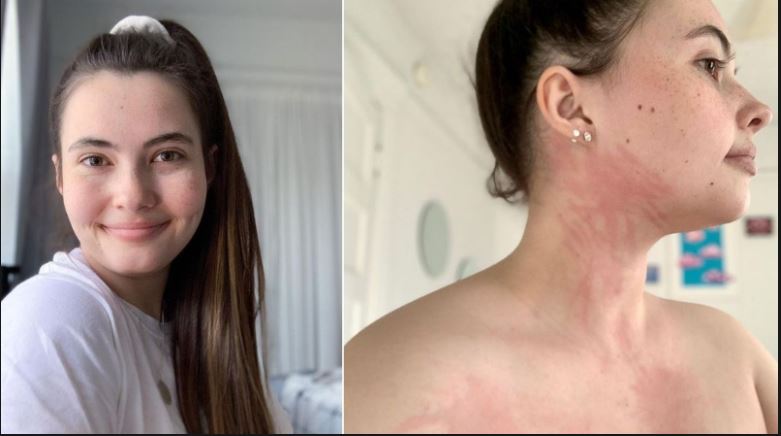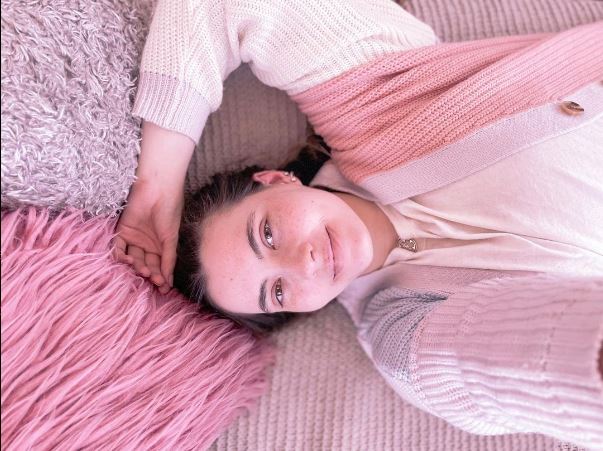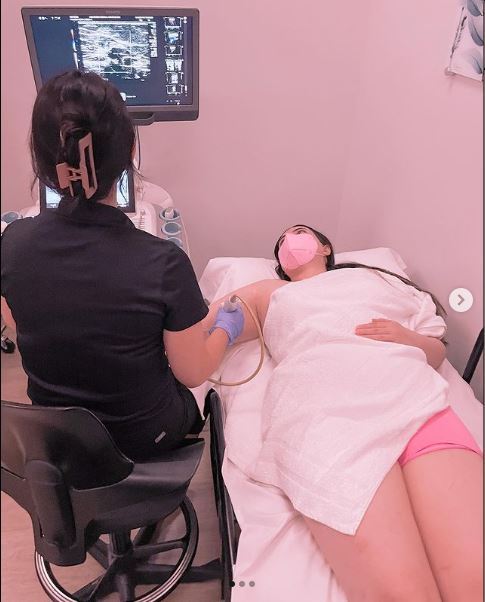A 25-year-old woman, Tessa Hansen-Smith, has bravely shared her battle with a rare ailment known as Aquagenic Urticaria, which causes her to be allergic to water.
Tessa’s ordeal began when she was just eight years old, and her condition has worsened over the years.
Aquagenic Urticaria is a condition that leads to severe allergic reactions when the skin comes into contact with water.
Tessa described the early signs, stating, “I would come out of showers and have huge welts on my skin, and my scalp would be bleeding after showering. So, the first things we kind of did was, ‘Okay, let’s take away your shampoos, take away your conditioner, take away any soaps you’re using.”

As a child, Tessa enjoyed normal activities such as playing, swimming, bathing, and drinking water like any other kid until these activities began to trigger mysterious symptoms. Now, water exposure results in itching, rashes, and hives on her skin. If she ingests water, she experiences a burning sensation in her throat and throughout her body.
Consequently, she primarily consumes milk because its water content is diluted by proteins, fats, and sugars, making it more tolerable for her.

After years of undergoing numerous tests and consultations with specialists, her mother, Dr. Karen Hansen-Smith, who is a family medicine physician, finally arrived at the diagnosis.
Dr. Karen expressed her feelings of guilt as a mother, reflecting on her missed signs and saying, “I feel a little guilty as a mom for not having seen when she would get out of the shower that she had hives and figuring it out way earlier that it was a water issue.”

As a healthcare professional, Dr. Karen has encountered numerous rare illnesses, but witnessing her own daughter’s struggle has been particularly heart-wrenching. She added, “It is heartbreaking. I still have my daughter, she’s 25. She’s not living the life she wanted to live.”
Despite the challenges posed by her condition, Tessa credits her positive outlook to the unwavering support of her family and friends. Her decision to share her story is aimed at shedding light on the difficulties faced by individuals with chronic conditions and fostering understanding and empathy within the community.
Tessa Hansen-Smith is sharing her story in an effort to raise awareness and offer support to others grappling with chronic conditions.
Tess takes walks but must avoid sweating too much, so she spends much of her days indoors, working on art, playing with her cats and reading.
“In the summertime, when people are going to the beach, people are having pool parties and trying to escape the heat the best they can, those are things I can’t participate in and can’t enjoy, so it can be really isolating,” Tessa said.
While avoiding water, her health took a drastic turn.
Tessa spent 12 days at Community Regional Medical Center after becoming so dehydrated that she developed ischemic colitis, in which blood flow is blocked to the colon, resulting in serious illness.
She is still recovering with physical therapy.
After that setback, Tessa is pouring out her story to help others with rare and often misunderstood conditions.
She’s part of a book entitled “Chronically Empowered” and even appeared on the Dr. Oz show.
“I always think about how much easier and how much better life would have been if this didn’t happen to me, but because I know I can’t really change that, I just focus on how I can help other people going through similar things,” Tessa explained.
Tessa’s story has gone viral on social media, and she uses her Instagram page Living Waterless to connect with others with rare conditions, offering understanding and support.
“Having been able to meet so many people and getting to talk to so many people from so many different walks of life really does give me a lot of joy and gives me a sense of purpose with the condition,” Tessa said.
She hopes to continue pursuing a nursing degree and says as a nurse, she would approach patients with compassion and, most of all, belief in their symptoms.
“I hope that I can go back to school again, I hope that I can get a job again, I hope that I can find a sense of normalcy in life again,” Tessa explained.

Tessa has an older sister who does not have a water allergy. It’s estimated only 100 to 250 people have Aquagenic Urticaria worldwide.
There is no cure for it, and Tessa and her parents meet with doctors in the Valley and in San Francisco to seek advancing allergy treatments.
For now, she takes antihistamines to alleviate the rashes, hives and itching from contact with water.



